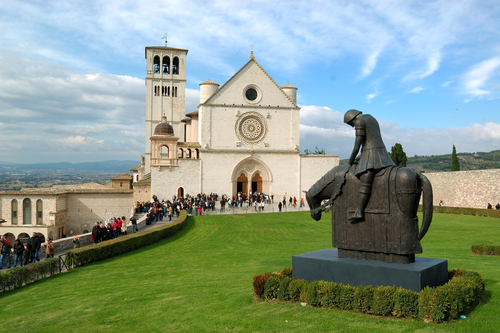
by Britanni Victoria Nelson
According to a 2014 poll by the private Institute for Political, Social and Economic Studies (EURISPES), the Religious demographics of the Italian Republic are as follows: 75 percent of the native-born population identifies as Roman Catholic while less than 5 percent of the Italian population identifies as members of non-Catholic Christian groups, Muslims, Jews, Hindus, Baha’i Faith adherents, and Buddhists. The most significant Christian groups include Eastern Orthodox, Jehovah’s Witnesses, Assembly of God, the Confederation of Methodists and Waldensian Churches, The Church of Jesus Christ of Latter-day Saints, and other smaller Protestant groups. Questions in regard to religious affiliation are not compatible with the secular nature of the state of Italy, thus any religious demographics must not be view as State sanctioned.
Although the Italian Constitution provided for a protection of religious freedom when it was passed in December 1947, Catholicism was the Italian state religion until 1984 when a revision of the Concordat between the Vatican and the Italian Government changed that status. While the official abolishment happened in 1984, the provision in Article 7 of the Italian Constitution of 1947 (see footnote below) “The State and the Catholic Church are independent and sovereign, each within its own sphere”, represents an implicit abolishment of that principle. Italy currently has no state religion, although the Catholic religion does enjoy some privileges not available to other religious groups because the Vatican City has sovereign status due to the historical political authority of the Catholic Church.
The Italian Republic Constitution provides for religious freedom under Articles 3, 7, 8, 17, 18, 19, and 20. Other laws and policies contribute to that freedom and the government generally respects religious freedom in practice.
Originally the Italian Constitution provided that the relationship between the Italian State and religious denominations (excluding the Catholic religion, already specifically mentioned in the Constitution) were to be regulated by agreement, called an intesa (accord). However, that provision in the constitution was ignored until after the Concordat modification with the Catholic Church in 1984. Today, Italy has individual agreements with religious denominations.
The Agreements are the only way to enjoy complete religious freedom. Currently, Italy has agreements with eleven twelve Non-Catholic groups and is in negotiations with the Jehovah’s Witnesses. The twelve groups are the Confederation of Methodist and Waldensian Churches, Seventh-day Adventists, Assemblies of God, Jews, Baptists, Lutherans, The Church of Jesus Christ of Latter-day Saints (Mormons), Orthodox Church of the Constantinople Patriarchate, the Italian Apostolic Church, the Buddhist Union, Hindus and, just recently, Sokka Gakkai (a Buddhist group. The law approving the agreement with Sokka-Gakkai (Italy) was only enacted on June 28, 2016.